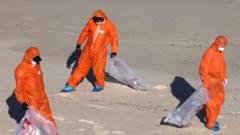The renowned beaches of Sydney have once again welcomed swimmers following the recent scare caused by the appearance of thousands of black tar-like balls, which led to their temporary closure earlier this week. The New South Wales Environment Minister, Penny Sharpe, announced that extensive clean-up efforts were enacted after the unusual pollution event raised health concerns among the public and environmental authorities.
Initial laboratory tests revealed the balls to be made up of chemicals similar to those found in cosmetics and cleaning products, although their exact source remains undetermined. The New South Wales Maritime authority clarified that while the balls are not highly toxic to humans, handling them is strongly discouraged. Mark Hutchings, Executive Director of the New South Wales Maritime, stated that although the balls pose minimal risk when left untouched, they should be reported to lifeguards if spotted on beaches.
Continuous testing by the New South Wales Environment Protection Authority (EPA) seeks to uncover the origins of this environmental mystery, with EPA Executive Director Stephen Beaman admitting that determining the source will likely span a few more days. As precautionary measures, individuals who inadvertently come into contact with the tar balls are advised to wash their hands thoroughly with soap and water or baby oil.
As investigations progress into the probable causes, the cleanup and beach safety protocols remain a priority, assuring the public that health risks have been mitigated for swimmers returning to enjoy Sydney's iconic coastline.
Initial laboratory tests revealed the balls to be made up of chemicals similar to those found in cosmetics and cleaning products, although their exact source remains undetermined. The New South Wales Maritime authority clarified that while the balls are not highly toxic to humans, handling them is strongly discouraged. Mark Hutchings, Executive Director of the New South Wales Maritime, stated that although the balls pose minimal risk when left untouched, they should be reported to lifeguards if spotted on beaches.
Continuous testing by the New South Wales Environment Protection Authority (EPA) seeks to uncover the origins of this environmental mystery, with EPA Executive Director Stephen Beaman admitting that determining the source will likely span a few more days. As precautionary measures, individuals who inadvertently come into contact with the tar balls are advised to wash their hands thoroughly with soap and water or baby oil.
As investigations progress into the probable causes, the cleanup and beach safety protocols remain a priority, assuring the public that health risks have been mitigated for swimmers returning to enjoy Sydney's iconic coastline.





















